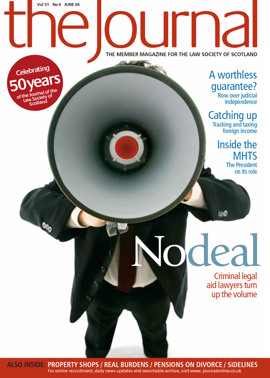Independence first

Another June brings a new President and contributor to this page although, having been Vice-President for one year and in shadow office before that, I have served a traineeship of sorts and am already halfway through my term as an Office Bearer.
I am very pleased to have been elected by the Council, especially at a time when we are looking ahead to possibly the biggest change in the Society’s history, with major repercussions for the wider profession, in the form of the Legal Profession and Legal Aid Bill. I stood for office, at this time, because of my concern for the independence and future of the profession and in light of my experience of regulation of the financial service industry, gained from many years on an FSA Advisory Panel and the Financial Services Practitioner Panel.
It is that industry’s model of regulation which forms the basis of the Clementi review and which is being visited on Scotland and Northern Ireland. With the bill likely to dominate the next 12 months, I hope to bring my experience and knowledge to the debate and continuing dialogue with the Labour/Liberal Democrat coalition which introduced this legislation.
My predecessor, Caroline Flanagan, and my successor, John Mackinnon, have agreed that we should adopt shared and, as far as possible, consistent objectives, bearing in mind that whatever we do will in some measure be dictated by what Harold Macmillan referred to as “events”.
The major themes, therefore, over the next 12 months, continue to be communication and an increased focus on the independence of the legal profession and access to justice. Caroline has carried out excellent work, together with colleagues at the Society, in improving communications with the profession, so much so that the first electronic bulletin has been sent, informing members of the work carried out by the Society on their behalf. I intend to carry on this work and, just as we want to improve communication with the profession, so it too needs to engage more with the public to emphasise the positive role we play and the Society’s achievements which are all too often unsung.
The independence of the legal profession is not only fundamental but of major concern at a time when the profession’s future is under examination. Since Labour came to power in Westminster, there have been enormous constitutional changes, not least the creation of the Scottish Parliament, in a relatively short time. With these have come growing concerns at the erosion of independence and the recent, very public concerns about threats to the independence of the judiciary. In fact, one of the most surprising aspects of the Society’s engagement with the Scottish Executive has been the very need to make the point of the necessity of a legal profession free from state control. It is and must remain a cornerstone of democracy. For this reason the Society will do all it can to ensure that any new legislation is human rights compliant (assuming there still is human rights legislation!), and so far as possible that any proposals on which the Society comments, lead to good law which in terms of the Society’s objectives, takes account of not only the profession but also the public interest.
The legal profession is very diverse, with nearly 30% of practitioners employed in-house and a very large concentration of solicitors in a relatively small number of big firms. Although the proposed reforms will not mean the end of legal services, the difficulty is in evaluating the consequences for different areas, particularly the “general practice” model and those mainly involved in legal aid work, where passing on additional costs is not an option.
Whatever the challenges brought by the bill, there are also likely to be opportunities, not least the end of the negative perception which we hear too often despite the fact that the Society has, especially in recent years, provided an efficient and cost-effective complaints system which, in any event, deals with only 0.4% of all business undertaken by solicitors.
What is clear is that there will be change, however welcome or unwelcome to different areas of the profession. The Society, with its Chief Executive and staff, Council and its Office Bearers, will continue to do all we can over the coming months to ensure that the bill, which the Scottish Executive hopes to pass into law before the election in May 2007, is as good as it can be or at least workable. The profession has been galvanised into action by the bill with (we are told) around 550 responses from solicitors and 45 from the public. I urge members of the Society interested in the future of the profession and the interests of the public to continue to join in the efforts to raise concerns about the bill with their MSPs.
In this issue
- Independence first
- Stand up for our system
- The talking stops here
- The bill: a half measure
- Turning up the heat
- Strengthened or threatened?
- The patient approach
- Another little job
- The wars of the portals
- The LLP factor
- Avoiding surprises
- The temporary judge survives
- HMRC to the rescue
- Core of the agreement
- A debate to be resumed
- The impact of human rights
- Website reviews
- Book reviews
- Is that burden dead yet?






